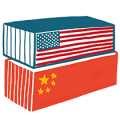

Huawei’s 90-day reprieve won’t impress China’s hardliners
Erratic and aggressive in the trade dispute with Beijing, Donald Trump is emboldening China’s military hawks, industrial state-interventionists, and nationalistic cheerleaders.
Huawei’s 90-day reprieve from some of the US trade restrictions announced mid May seems to have set up the kind of cliff-hanger Donald Trump loves. Come August, will he have to see through the sanctions against the telecoms equipment maker, or will his Chinese counterpart have made concessions that make US President magnanimous? But lovers of suspense, Trump included, should know that China’s president Xi Jinping has no incentive to bend in the trade war except as a last resort. Ever more vocal groups in China would welcome a country more decoupled from the world economy.
Europe will soon have to think about the impact of a possible Chinese decoupling from global markets
Trumps erratic and aggressive style of raising the pressure on Xi, his negotiators, and Chinese companies alike has emboldened hawks, state-owned company officials, and nationalists. They loudly propound what Trump might call a “China first” policy that includes turning away from the country’s cautions integration into the world economy and instead strengthening China’s state capitalist model. Europe and its companies will soon have to think about the impact of a possible Chinese decoupling from global markets and value chains, and limitations on foreign-technology use.
Even before Trump went for the “nuclear option” involving Huawei, hawks such as Dai Xu, a former colonel in the People’s Liberation Army (PLA), had publicly expressed the hope that negotiations would break down and Beijing seize the chance to “kick out all the American companies.” Tan Yungang, another former PLA officer, said the US was seeking to contain China and “openly sees us as their biggest enemy.” People like Dai and Tan have a bigger say in Beijing than in recent years.
China’s state-owned sector has little truck for the US
China’s state-owned sector, especially the industrial-military complex, also has little truck for the US. It is interested in retaining a protected home market and strong state support, not least for research and development. Even under Xi, reforms of the state-owned enterprises (SOEs) have been slow. With most industries of strategic importance to China’s development strategy and national interest dominated by SOEs, significant structural changes were unlikely even before the recent escalations.
Over recent years, senior officials such as Wang Yong, former head of the State-owned Assets Supervision and Administration Commission (SASAC), the government overseer of SEOs, have worked to strengthen the state-owned sector. “Natural monopolies” in energy, infrastructure, and resources, and state support of key technologies in car making, AI, defense, and aerospace, has created a strong dependence on SOEs as industrial backbone of China’s development. In the face of US demands, these companies now have good arguments that China needs state capitalism more than ever.
Lastly, the Chinese nationalists were also gaining in voice even before Trump’s Huawei decision. After initially muted responses to the rise in trade tensions, China’s state-run media became much more vocal mid May. Perhaps most notably, Kang Hui, the anchor of CCTV’s prime-time news program, declared China “unwilling to fight, but not afraid to fight” over trade. “Having experienced more than 5,000 years of disturbances, what kind of battle formation have the Chinese people not seen?”
Submitting to American demands would be a huge loss of face for Xi
These domestic strains of geopolitical hawkishness, industrial self-reliance, and historically founded nationalism feed right into the pride in China’s progress and a sense of a re-emergent China propounded by Xi. The “rejuvenation of the Chinese nation” and the “China Dream” are themes the president has promoted intensively, starting with his opening of the exhibition “The Road to rejuvenation” to his comments on national self-reliance in technology and agriculture. Given this narrative, submitting to American demands would be a huge loss of face for Xi in particular.
Of course, Xi knows there are good reasons for China to deepen its integration with global markets, not least for the many Chinese companies, SOEs among them, eying foreign markets. But under Xi, economic benefits will not stand in the way of more important, strategic political interests. He has made it his main political project to secure the Chinese party-state, and reestablish China as an independent nation of wealth and power. Trump’s style makes it easier for Xi to paint a hostile international environment that demands stronger Chinese state capitalism and one-party rule.
Trump’s erratic and aggressive course could prove opportune for Xi
This last point shows how deeply opportune Trump’s erratic and aggressive course could prove for Xi – so opportune, in fact, that one might speculate the US President’s initial escalation may have been deliberately provoked by China. The Chinese leadership’s extensive last-minute revisions to the trade deal draft, which led Trump to raise import duties on some Chinese goods, were a “sea of red,” according to Christopher Johnson, an expert at the Center for Strategic and International Studies.
But even this fascinating possibility pales beside a more fundamental point. Trump’s repeated and very public escalations have in China rallied support for the status quo – for the Chinese Communist Party, for the state-party system, including state capitalism, it underlies; and for Xi, the leader of a proud nation. Trump should use Huawei’s 90-day reprieve to reflect on the fact that his policy is legitimizing Xi’s core aims of securing the state under party control - and of making China great again.

